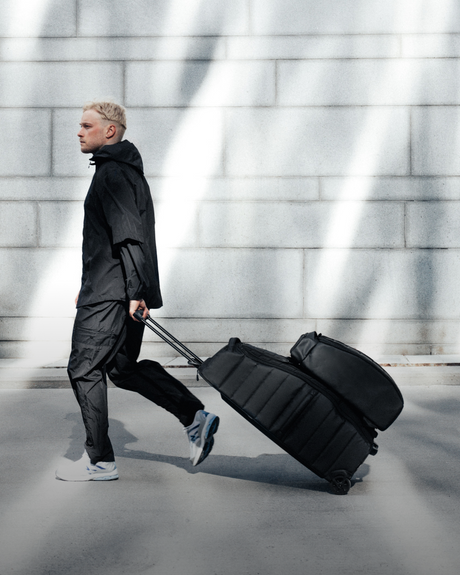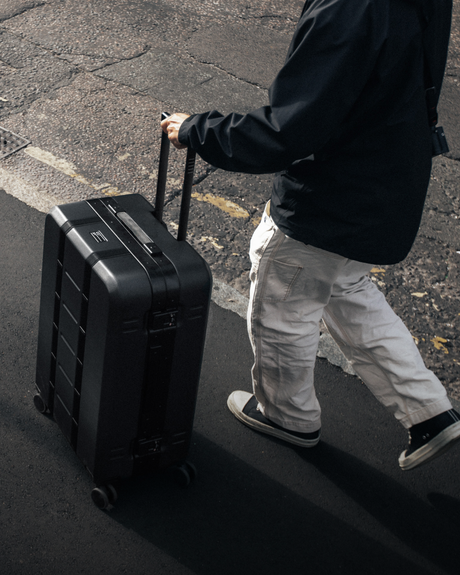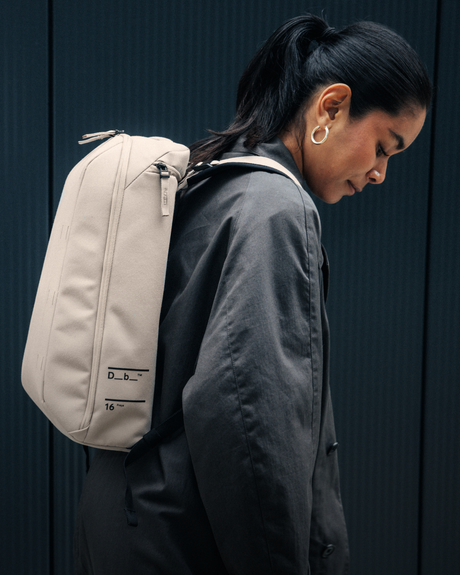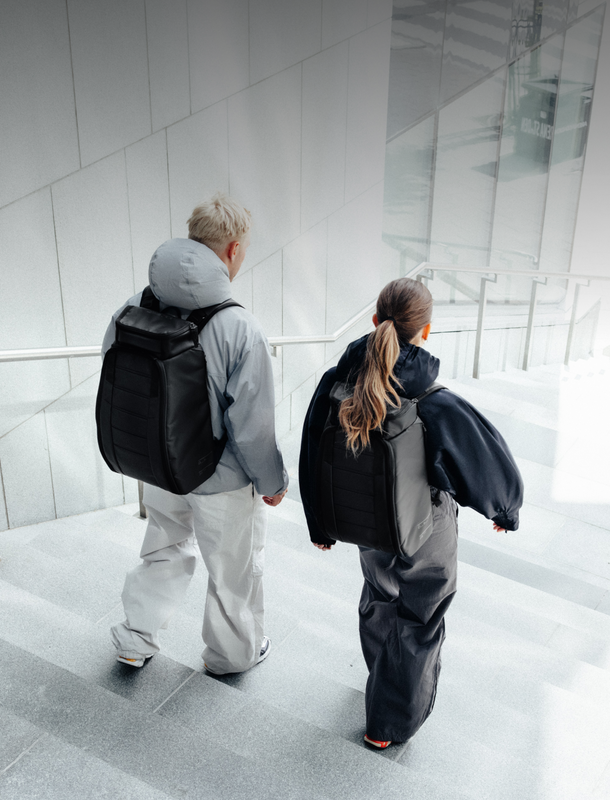Catching up with Chris Burkard
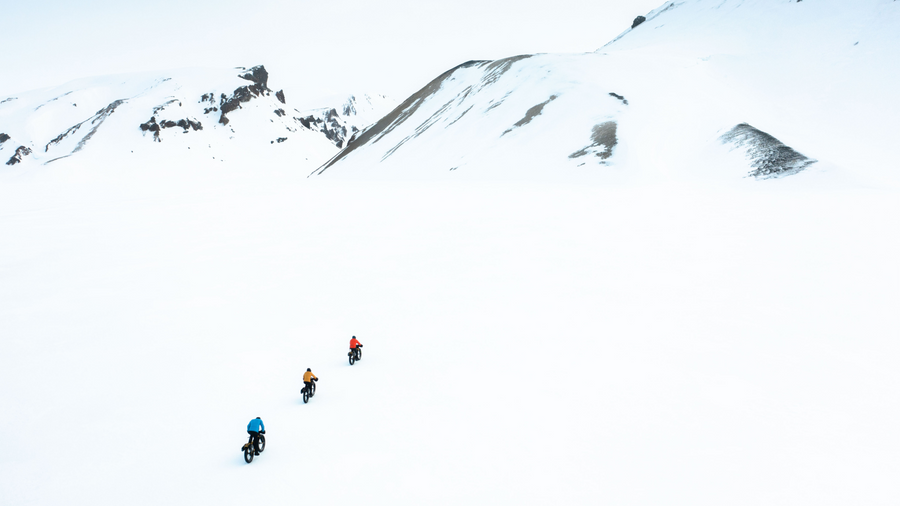
Over the last two years, hosting meetings, catch-ups and calls online has become a regular thing. Some calls are fun and creative, some are ones where you zone out and watch a surf movie in the background, some you forget what you were talking about 10 minutes after handing up, and then, some are the kind of calls you tell your friends about. This was that kind of call.
Two days ago, we sent an email to Chris Burkard, asking him if he would be keen to join us for a call to talk about his newest Kickstarter campaign, which is fundraising for his new film. A few emails later, we ended up on a call with him that turned out to be one of those phone calls you can’t help but smile throughout and be inspired by. We did our best to put that call into words below, enjoy.
Db: Hey Chris, how are you doing?
Chris: Yoo! I’m in my car driving through Arizona, so my signal isn't great - I hope that you guys can hear me okay. Other than that, I’m doing fantastic.
 Db: Nice to hear! We can hear you fine, so all good. Should we start with you telling us a bit about the Kickstarter project and what the film is about?
Db: Nice to hear! We can hear you fine, so all good. Should we start with you telling us a bit about the Kickstarter project and what the film is about?
Chris: Absolutely! Yeah so it all started on an incredible winter adventure through Iceland last year. The trip was a success by all means; we ventured into the unknown, we crossed the glacier, we created a new route, but what we didn't realize was that the real story didn’t end there.
When we got back, we realized that one of the people who was on the trip was suffering from addiction, and he had gone on the trip in the hope to overcome some of that. Ultimately what ended up happening was that he got stuck in Mexico City on his return journey, while the rest of us had made it back to our families. He was an Australian citizen, and during Covid he couldn’t get home - he continually got denied at the border, week after week, and ultimately he ended up relapsing. So the story is a story of personal growth and about facing your inner demons. It draws parallel with our adventure in Iceland and raises the question - can a landscape or experience change you?
This trip had never been done before, it was a huge adventure, it was really eye opening and generally, I would say that at the end of an expedition you're very much the best version of yourself - you’re on the highest high. Even despite this, I do not think a landscape or experience can change you. You can climb Mount Everest as an asshole, and still come down from it as an asshole.
The process can have an impact on you, and can lend to change, but it’s a fact that some of these things we deal with will always define us. They are aspects of our lives that we will always have to face, no matter what. Always.
This film is an answer to how we deal with that stuff and how through wilderness, through landscape, through experiencing wild places with other people, we can see the best versions of ourselves and it can help us face and deal with the demons.

Db: I’ve already got goosebumps hearing your first answer.
Chris: I love that. We are also trying to create a storyline that hasn’t been done a lot, where there are almost two stories that are happening simultaneously. There’s the biking trip across Iceland itself, like a flashback and then there’s this person, living a very real life - and feeling stuck in everything. And it’s almost like when you feel your highest high, that’s when you can fall into your lowest low. When you are at the top, you can fall the deepest.
Db: Have you launched any project before on Kickstarter, or is that one first of the kind?
Chris: It’s something I’ve done multiple times. I’ve kickstarted my children’s book, and I kickstarted my very first film “Under An Arctic Sky”, which was one of the highest-funded, independent adventure films ever. I raised about $280,000 dollars, which was huge for us. It was a huge thing for me and one I never saw coming.
And with the film now, it’s a bit more challenging. It’s more meaningful, it’s a more human story - it’s not just pure beauty. If we wanted to, we could have come back from Iceland and made a great adventure story that was about twenty minutes long and everyone would have been happy. However, we felt like telling a story about a human struggle was so much more meaningful, necessary and important, but so much harder to do. That’s why we are looking for every kind of support possible.
Db: Do you always launch a Kickstarter after you’re done with the project, or do you ever do it before the project?
Chris: I have done it both ways. I think with this project we were forced to do it the way that we have done, since we only realized after the trip that the story was so much bigger than we thought and there was so much more potential in the story we wanted to share. I do feel like at the inception of the concept, if we knew we just wanted to make a book or a film or a companion piece, I would have run the kickstarter project before.
At certain points, you look at your project and you realize ‘does this have more legs to stand on and should I chase those legs’ - and that can be a scary point. I now feel that unless I’m investing into a project with my whole heart and an energy that scares me, I don’t want to do it.
I have no idea if this project will be funded or not, but I know that it’s a story worth telling, and since we aren’t sure how the film will look at the end, it makes it scary but exciting at the same time. It’s backed by the community, meaning it will be a reflection of exactly the type of film they want to see. Without having big media houses behind the film supporting the project, or sponsors telling us what we should include, we can truly do what I, together with the community, think we should.
Db: The film deals with the subject of addiction. Would you say that you find traveling addictive?
Chris: Absolutely, and I think that is one of the things that make it so interesting. A lot of people think that addiction is something that has to do with alcohol, or cigarettes, but the truth is that all of us have an addiction. It can be stepping out of your comfort zone or going on adventures. There are also positive addictions - not just the negative ones. You can be addicted to pushing yourself one step further, finding your limit, traveling, exploring. To me, it’s a question of how we use addition - do we use it as a positive or negative thing? In the film, one of the main threads is talking about how addiction takes more than one form, it’s not just negative. Some of us have addictive personalities, and it’s on us to learn how to deal with it since we will never be rid of it.
Db: Iceland has been a recurring theme for you in your work. I think you’ve been there over 50 times, what makes it so magical?
Chris: Haha. Great question. There is a saying in Icelandic, called þetta reddast which means “everything will work out”. What I love about it is that you are dealing with a culture that very much optimizes living in the moment. For example, for thousands of years, they haven’t been able to plan a wedding six months ahead, haven’t been able to plan anything ahead of time, because of the unpredictable nature of the weather. The geological formation, landscape and weather determines what will happen there - whether crops will grow, whether the animals will survive. It forces you immediately into “now”, so it’s a special thing to always visit a country that lives in the now. It takes away some of the nonsense things, and really brings the whole country into living in the moment - that’s what I love about it.
Db: Do photography projects still give you the same kick? Or is it bikepacking and adventuring that gets you excited now?
Chris: You know, photography is one of my ways of really expressing my creative energy and creative vision for the world. I think I always want to try to be more immersive with the camera. It’s just that thing you pull out when you see something you want to capture or a story you want to tell, but how do you get to those stories? How do you get to that experience? The answer is it relies on an immersiveness that I think is best found in doing human-powered adventures. There is a slow process that comes with moving through a landscape in a more intimate way, a more visual way, and it’s so important, so critical. This is, for me, one of my favorite ways to experience a place right now - biking, climbing, surfing, all of these are the best ways to truly experience the landscape and discover the meaningful stories within it.
 Db: Db: Since you’re traveling a lot, and you’re doing laps of the world all of the time, how do you ensure you give back to mother nature?
Db: Db: Since you’re traveling a lot, and you’re doing laps of the world all of the time, how do you ensure you give back to mother nature?
Chris: Ultimately, for me, sharing what I experience in the world is the way in which I can give back. If I was to experience all this incredible purpose, meaning, depth and life changing experiences, and I didn’t share that with anybody - what good would it do the world? What good would it do me? What good would it do anybody? Whether you’re sharing a story about human growth or whether you’re sharing a story about a sensitive, sacred or wild place - I think the goal is to share what that experience means. It doesn’t have to be perfect, it doesn’t mean I have all the answers or solutions, it just means you experienced something there, and the most human thing we can do is share our experiences in a more intimate and vulnerable way.
Db: How would you describe your directing style?
Chris: My directing style is not to describe the story to the people, but make them see and feel it. To me it’s critical to let the viewer take an opinion. That’s something really powerful and sometimes uncomfortable to do, but I find that valuable.
Db: How can we and our community support the project?
Chris: It’s pretty easy, by helping us fund the Kickstarter project which will make it possible to add all extra stuff, like creating custom music and shooting additional content. All this will add value to a movie that might change a person's life in the future.
“Tell the story that scares you. That’s important. If you feel like the story is too cut and dry or basic, then it’s already been told and not worth your time.”
Db: What advice would you give to young creators, who have their own project in mind that they wanna make?
Chris: Tell the story that scares you. That’s important. If you feel like the story is too cut and dry or basic, then it’s already been told and not worth your time. Find the story where you’re scared to write the words and it makes you feel afraid to share it with others. Most of the time, those are the stories the world has to hear.
Db: We are about to launch the Db Fund project, where we will financially support a handful of creators to tell their stories. So hearing that from you, feels like an inspiration to people to go out, and do things. If you would like to be a mentor for some of them, or tell some of your stories, that would be epic.
Chris: Oh yes, for sure. I wanna blow projects like this out. As a brand ambassador, I would love to teach the younger generation how to tell stories. That’s what I’m most passionate about.
Db: That’s amazing, let’s catch up about that later. Thanks for the best call of this week, Chris! It’s been 30 minutes of inspiration.
Chris: For sure. Haha, thank you! Cheers and enjoy Portugal!
Words by: Tin Kosir
